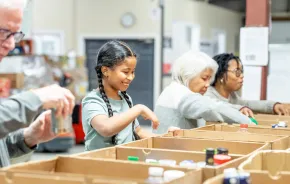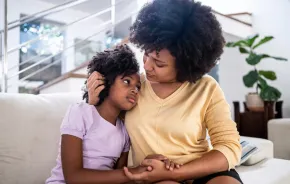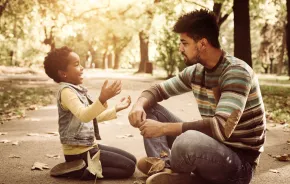
When I heard the soft cries of our newborn baby, I wanted to know what the gender was. My husband had tears of joy in his eyes as the obstetrician handed our child to him for a brief second. “Is it a girl or a boy?” I asked, exhausted from the labor but anxious about our new progeny. We were now officially parents.
“It’s a beautiful child,” he said.
“Congratulations on your daughter” the nurse answered my question.
My husband was so overwhelmed seeing the tiny baby in his hands, his mind went completely blank. Tears kept flowing down his eyes. He was holding his baby; his flesh and blood.
“She’s the most beautiful child I have ever seen,” he finally answered.
“Is she healthy?” I asked.
“Yes ma’am,” said the nurse as I drifted to sleep, drained of all my energy from the birthing process. My husband’s expression stayed with me.
When I awoke, my mother-in-law was distributing sweets, my mother was reading the Bhagavad Gita, my father and father-in-law were on the phone talking to everyone they knew, sharing the good news. My husband was waiting for the doctor to get our child to the room.
“I love you,” he whispered in my ear. “You’ve given me the most precious gift ever.”
“Are they happy?” I asked signaling to our parents.
“I think so,” my husband said, kissing me on my forehead.
I suddenly started sobbing, and I had no idea why. My parents and his parents stopped what they were doing and rushed to my side. “Are you OK?” Amma asked. “Should I call the doctor?”
I didn’t answer. I kept crying.
“She’s fine,” my husband said. “I think this is the exhaustion.”
I still don’t know why I cried, maybe it was post-partum emotions. Or maybe it was the fear that my daughter would not be loved by her grandparents as much as she would have been if she were a boy.
We could not find out the gender of our child before she was born — prenatal sex determination is illegal in India. My parents and in-laws kept referring to the baby as if it were a boy. I knew the importance of having a boy in the family. They wanted an heir, the chirag (torch bearer) to carry the family name forward. So when my daughter was born, I feared that maybe they were disappointed.
When there was this huge Indian campaign on Twitter with the hashtag #Selfiewith-Daughter, it just felt superficial and hypocritical.
But my fears were uncalled for. Yes, they wanted a grandson, but that did not mean that they wouldn’t love their granddaughter. DD now has all her grandparents dancing to her tunes. They never say no to anything she says or asks them to do.
But, my father asks me to be extra cautious when she is swinging in the monkey bars — a girl child should not have scars. He is also very concerned that we are bringing up our child in the U.S. where she is exposed to so much information, so early. My father-in-law asks us to keep steady savings — for DD’s marriage, as we are the parents of a daughter and we should be prepared for what the groom’s parents may ask for.
It’s not something they say outright, but it’s something they’ve been brought up thinking: Girls need to be handled with care. And that they are a liability. Even if the dowry system is illegal in the country, that doesn't mean it no longer exists.
So when there was this huge Indian campaign on Twitter with the hashtag #SelfiewithDaughter, to me it just felt superficial and hypocritical. There seems to be acknowledgement of the fact that girls are important in the country, but when a woman voiced her opinion that the campaign only addressed the tip of the deep seated iceberg of Indian women’s standing in the society, she faced immediate backlash. You cannot profess your love while spewing venom for the very cause you are supporting: respecting women and giving them the independence to think for themselves!
The campaign was first started in Haryana, a state in India that has a very low female-to-male ratio (so much so that women are actually brought from different states of the country as brides for their men). The campaign was well-intentioned, and was included as part of a much larger initiative of the Prime Minister Narendra Modi — the Beti Bachao, Beti Padhao (Save the Daughter, Educate the Daughter) initiative. I am supportive of the intention behind the campaign: of celebrating our girls, of sharing the pride of being parents to the girl child.
Yet I know it does not address the deep-rooted problems, the core of the issues in India. It does not travel all the way to the rural parts of India, where the problem of female feticide and infanticide is arguably far higher. Nevertheless, it is a tiny step in the right direction.
To truly celebrate our women, it is important to create a level playing field, where a man and a woman are respected and accepted equally. Where a woman is no longer considered a liability, a burden, or the weaker sex.
Except in a few matrilineal societies like the Khasi tribe in Meghalaya, where the girl child is celebrated, there’s arguably a subconscious moment of hesitation, coming to terms with the birth of a girl child in the other states of the country. The day that moment does not exist, the day that the tiny twinge of disappointment does not seep in, is the day that the girl child is truly welcome from the moment she enters her mother’s womb. Until then, these small steps may just be glimmers of hope. They may help change the exterior of the house, but the real problem is the foundation on which it sits.












